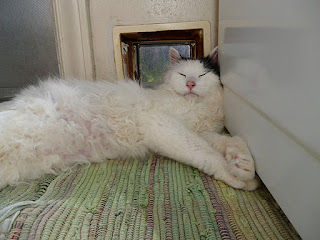
You heard a lot about kittens in the last few posts, however the majority of my clients are senior kitties. Alexander the KittyStar is actually considered a "senior" at 16. Many (most) cats who live long enough suffer compromised kidney function in their later years. I started my kitties on a raw meat diet along with canned food after I had several male cats, including Alexander, develop feline urological syndrome (FUS) over 14 years ago. My understanding is that the acidity of a mainly raw meat diet prevents crystals and blockages from forming. The high water content in a raw and/or canned diet versus exclusively dry food can also help prevent or slow kidney disease. Many conventional vets now recommend canned foods over kibble for this reason. The low protein concept in treating kidney disease is controversial and not one that I have chosen to follow for my kidney kitties. In addition to subqutaneously hydrating your kitty, here are some ideas to keep your cat well-hydrated: gradually add a little extra water to the dish - more "gravy" which to some cats is the best part anyway; a favorite treat of Alexander's is turkey or chicken baby food mixed smoothly with warm water; snacks are important because kidney kitties can feel nauseous (ask your vet about small doses of Pepcid to help with this also); keep water dishes all around the house, especially the bathroom, and use china bowls because these keep the water cool; a lot of cats like either running water from a faucet or fresh water as soon as you refill the bowl so do this frequently. If your kitty has been diagnosed with kidney issues, check out the great resource I listed above. Senior cats can offer wisdom, solace, affection, all without climbing the curtains like kittens! As Eckhart Tolle commented, "I have lived with several Zen masters - all of them cats."
No comments:
Post a Comment